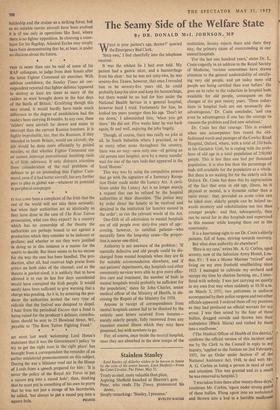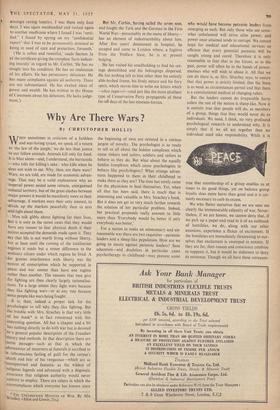The Seamy Side of the Welfare State
By DR. DONALD McI. JOHNSON,, MP HAT is your patient's age, doctor?' queried the Emergency Bed Clerk.
'Sixty-two,' I lied cheerfully into the telephone receiver.
It was the whitest lie I had ever told. My patient had a gastric ulcer, and a he=morrhage from his ulcer : but he was not sixty-two, he was seventy-five. I knew, however, that once I revealed him to be seventy-five years old, he could probably keep his ulcer and keep his haemorrhage, but there would be no bed for him under the National Health Service in a general hospital, however hard I tried. Fortunately for him, he looked ten years younger than his age. 'Don't let me down,' I admonished him, 'when you get there.' He did not. Five weeks later he was back again, fit and well, enjoying the joke hugely.
Though, of course, there was really no joke at all. In South Suburbia where I practised, as in so many other areas throughout the country, there was no way—save only one—of getting an old person into hospital, save by a many months' wait for one of the rare beds that appeared in the, local 'Homes.'
This way was by using the compulsive powers that go with the signature of a Summary Recep- tion Order made under the Lunacy Act. A certi- ficate under the Lunacy Act is no longer merely a request that can be refused by the hospital authorities at their discretion. 'The justice may by order direct the lunatic to be received and detained in the institution for lunatics named in the order'; so run the relevant words of the Act.
One-fifth of all admissions to mental hospitals are of old people over sixty-five years of age : coming, however, to certified patients—who naturally form the long-stay cases—the propor- tion is nearer one-third.
Authority is not unaware of the problem : 'If mentally defective and old people could be dis- charged from mental hospitals when they are fit for suitable, accommodation elsewhere, and if out-patients' departments, day hospitals and other community services were able to give more effec- tive care and treatment, the number of beds in mental hospitals would probably be sufficient for the population,' states Sir John Charles, senior medical officer of the Ministry of Health, in dis- cussing the Report of the Ministry for 1954.
Anyone in receipt of correspondence from mental hospitals cannot fail to be shocked by the entirely sane letters received from inmates— mainly elderly people, fully recovered from any transient mental illness which they may have possessed, but with nowhere to go.
For, of course, once inside the mental hospital, once they are absorbed in the slow tempo of the institution, society rejects them and there they stay, the primary cause of overcrowding in our mental hospitals.
'For the last one hundred years,' states Dr. L. Cosin cogently in an address to the Royal Society of Medicine, 'various committees have drawn attention to the general undesirability of certify- ing very old people, and yet today more old people are being certifted than ever before.' He goes on to refer to the reduction in hospital beds available for old people, consequent on the changes of the past twenty years. 'These reduc- tions in hospital beds are not necessarily dis- advantageous,' Dr. Cosin concludes, 'and can even be advantageous if one has the courage to reassess the problem and find new solutions.'
Dr. Cosin has that courage. This is evident when one accompanies him round the old- fashioned wards and passages of the Cowley Road Hospital, Oxford, where, with a total of 210 beds in his Geriatric Unit, he is coping with the prob- lems of old age in a total population of 250,000 people. This is less than one bed per thousand population; it is also less than the percentage of beds still available for the population as a whole.
But there is no waiting list for the elderly sick in Oxford. Dr. Cosin has done this by appreciation of the fact that even in old age, illness, be it physical or mental, is a dynamic rather than a static event : that, provided an acute crisis can be tided over, elderly people can be helped to- wards recovery and rehabilitation not less than younger people : and that, subsequently, they can be cared for in day hospitals and supervised in this manner while keeping them out in the community.
It is a heartening sight to see Dr, Cosin's elderly patients, full of hope, striving towards recovery. But what does authority do elsewhere?
'Here is my case,' writes Mr. A. G. Corbin, aged seventy, now of the Salvation Army Hostel, Lon- don, El : 'I was a Master Mariner "retired" and living on my own freehold smallholding since 1923. I managed to cultivate my orchard and occupy my time by chicken farming, etc., I inter- fered with nobody. I was just carrying on quietly in my own free way when suddenly at 10.30 a.m.
on March 3, 1951, two policemen in uniform accompanied by their police surgeon and two other officials appeared. I ordered them off my premises as they had produced no official warrant for my,, arrest. I was then seized by the four of these bullies, dragged outside and thrown into their ambulance (Black Maria) and rushed by them into a madhouse.'
('The Medical Officer of Health of this district,' confirms the official version of this incident sent me by the Clerk to the Council' in reply to my inquiry, 'applied to the Justices on 2nd February, 1951, for an Order under Section 47 of the National Assistance Act, 1948, to deal with Mr. A. G. Corbin as being a person in need of care and attention. This was granted and as a result he was removed to hospital.') 'I was taken from there after twenty-three days; continues Mr. Corbin, 'again under strong guard of these bullies. Flung again into an ambulance and thrown into a bed in a horrible madhouse amongst raving lunatics. I was there only four days. I was again manhandled and rushed again to another madhouse where 1 found I was "certi- fied." 1 found by spying on my "confidential report" that I was to be permanently detained as being in need of care and protection, forsooth.'
('He is sullen and resentful,' reads Section 3a of the certificate giving the complete 'facts indicat- ing insanity' in regard to Mr. Corbin. 'He has no insight into his condition. He has no realisation of his affairs. He has persecutory delusions. He has many complaints against all authority. These are not substantiated. He has exalted ideas of power and wealth. He has written to the House of Commons about his delusions. He lacks judge- ment.) But Mr. Corbin, having sailed the seven seas, and fought the Turk and the German in the First World War—presumably in the name of liberty— has an element of indestructibility about him. After five years' detainment in hospital, he escaped and came to London where, a fugitive from the Welfare State, he is at present lodging.
He has visited his smallholding to find his cot- tage demolished and his belongings dispersed. He has nothing left to him other than his entirely able-bodied frame, his lively nature and his fiery spirit, which moves him to write me letters which —ehett fugaces!—read just like the more ebullient type of Conservative Party propaganda of those far-off days of the late nineteen-forties.











































 Previous page
Previous page